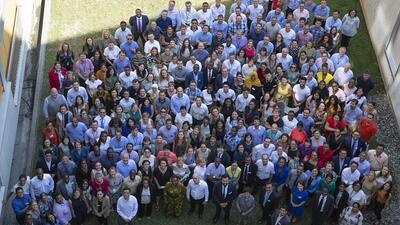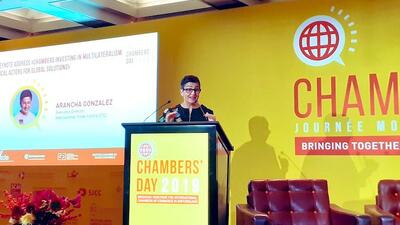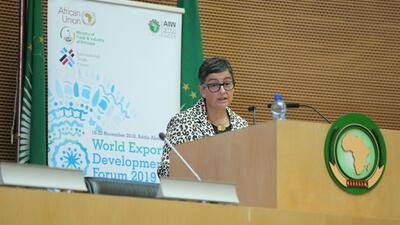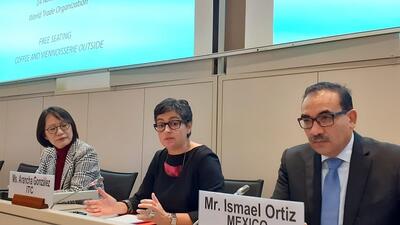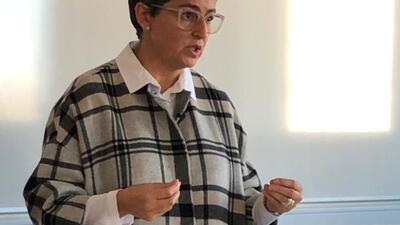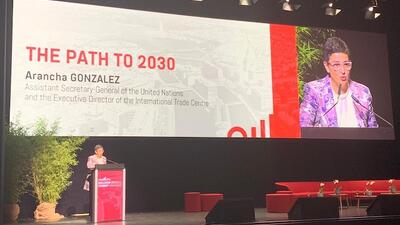The European Union market for sustainable products
Speech delivered by ITC Executive Director Arancha González at the launch in Brussels of "The European Union market for sustainable products"
Brussels, Belgium
Good morning.
I would first like to thank Commissioner Malmström for hosting us here today and for her words of introduction. It is a pleasure to work with you and your team at DG Trade on these crucial issues of transparency in trade, sustainability and spreading the benefits of trade more equitably.
In today’s event we want to spotlight the European Union Market for Sustainable Products.
Sustainability and fighting against climate change is one of top priorities of European citizens who are going to the ballots. This where this report is useful for what it tells us. Sustainability is not a luxury nor should it be an afterthought. Rather, sustainability should be a core ingredient of the economy and trade.
Sustainable product sales in the European Union are rising fast, and European retailers are shifting towards sourcing and selling products that are socially and environmentally sound, or what we at ITC call “GOOD TRADE”.
ITC, as an agency of the United Nations and World Trade Organization, is dedicated to promoting “GOOD TRADE” and fully aligned with Commissioner Malmström’s Trade for All strategy.
In this light, we have worked with DG Trade over the past several years to launch the first ever EU Cities for Fair and Ethical Trade Award and to complete the first of its kind study of the retail market for sustainably produced goods in eight sectors in France, Germany, the Netherlands, Italy and Spain. We are proud to team with you in these efforts and we appreciate the trust you have shown in us to implement these projects in an efficient, impartial and impactful manner.
A few highlight about the research we have conducted.
Retailers in France, Germany, Italy, the Netherlands and Spain are finding growing consumer demand for fair and ethical products. In partnership with their suppliers, both inside and outside the European Union, many retailers are working to introduce environmental and social sustainability standards. They are moving towards GOOD TRADE.
Our study reveals that 98.5% of retailers that were surveyed in France, Germany, Italy, the Netherlands, and Spain countries consider sustainability as a factor in product sourcing; 96% implement strategies to buy from sources that are certified as socially and/or environmentally sustainable; and 76% have public commitments to sustainable sourcing strategies.
What’s more, nearly all retailers surveyed – 92% – expect that sales will keep rising for the foreseeable future.
As consumers demand more transparency on the sources of products that they buy, and there is greater engagement from retailers on environmental and social issues, we are seeing these same retailers better adapt their global sourcing strategies.
In this study, you will learn about our findings examining sustainable trade sourcing policies by retailers in Europe. These are new approaches aiming to change the inherent business habits towards more ethical and responsible sourcing strategies, and also making the consumer aware about how their purchasing decisions influence the nature of production and trade and how it will affect the micro, small and medium sized businesses (MSMEs) in developing countries.
In this way, GOOD TRADE can be an effective lever to achieve key United Nations Sustainable Development Goals, such as SDG 8 (economic growth) and 12 (sustainable consumption and production), among others.
Before I conclude, let me share with you four key takeaways from the study:
First, sustainability is not easy. There is no silver bullet. Or….no silver superfood. We heard from hundreds of retailers on how such a mundane-sounding issue of multiple audits takes resources that factory owners would otherwise invest in improving production processes into fair and ethical ones.
In the textile sector, as an example, a divide between global and local exists. Companies producing for local markets are not necessarily held accountable for basic labour rights in the same way as they would be for external markets. Thus, sustainable production is usually the requirement of the importer or buyer, presumably based in the ‘North’, rather than the common practice of the local supplier and the requirements of the domestic buyers.
The Second takeaway from our research is that our efforts to achieve the SDGs require that we take a holistic value chain approach with enforceable rules. This means engaging local stakeholders and recognising fair and ethical standards. With big data, digital transformation and cheaper and constantly evolving technology, the full traceability of value chains is possible.
Voluntary standards, self-assessments, and audits are often viewed as not sufficient on their own to make systemic and impacting change. We need smarter approaches, rules and regulations, which go hand in hand with smart private-public-partnerships.
Third, sustainability must be valued and priced appropriately. As we make value chains more sustainable, we cannot always ask the first steps or “upstream” actors of the chain – often those weaker and with less bargaining power – to absorb the full cost of the making the necessary changes in business processes to produce sustainability. Sustainability is a source of competitiveness but its benefits must be more equitably shared along the value chain, especially those MSMEs at the beginning of the chain. Adequate remuneration must also be part of responsible consumption.
On this, the Fourth and final takeaway relates to ourselves as consumers. Sustainable production can be nudged by sustainable consumption. As we all know, more sustainable consumption does not necessarily relate only to buying sustainable products. Sustainability is a lifestyle. This is the interesting piece of the puzzle in my view. There is a consensus that we need to incentivize consumers to do their part. To take their own personal social and environmental audits, to take stock, and make changes to their consumption choices that favour GOOD TRADE.
Reflecting on the crucial role that the demand for sustainable products plays for retailers and across value chains, I have one more thing to say: This report carries an important message, especially for non-European businesses seeking to export to buyers in the EU: sustainability is KEY to your business model if you want to succeed in winning over European customers and consumers.
With all of this in mind, I am now looking forward to hearing from our distinguished panellists, and how we can take the learning and insights from this report to support and promote GOOD TRADE FOR ALL.
Thank you.




